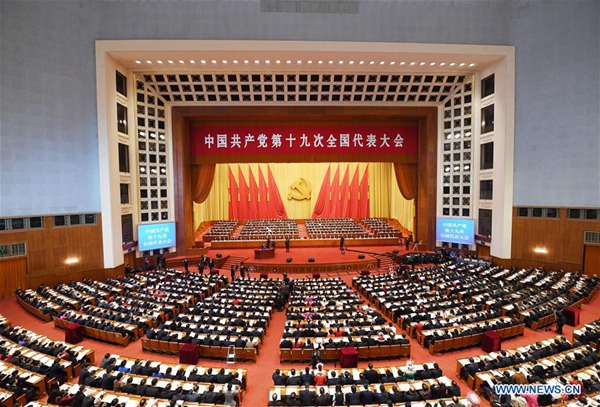CPC National Congress: Steady progress and future focused
- By Eugene Clark
 0 Comment(s)
0 Comment(s) Print
Print E-mail China.org.cn, October 18, 2017
E-mail China.org.cn, October 18, 2017
 |
|
The Communist Party of China (CPC) opens the 19th National Congress at the Great Hall of the People in Beijing, capital of China, Oct. 18, 2017. (Xinhua/Zhang Duo) |
The 19th National Congress of the Communist Party of China (CPC) has just begun. It is an event that occurs only twice each decade, so the present meeting will set China’s course for the next five years.
Notwithstanding speculation from some about the possibility of major changes, I favor the arguments of those who predict a focus on stability, harmony, order and steady progress rather than on big policy shifts. In short, the work of the Congress will focus upon and build on the work of prior meetings.
China’s focus on stability is welcome at a time when much of the world is unsettled due, for example to North Korea’s nuclear ambitions, an unpredictable President Donald Trump, Brexit, continuing problems in the Middle East, and a lot more.
Stability is essential if China is to continue its economic and social development in a 21st century Information Age and inter-connected world. This means creating a more diversified economy with a focus on enhanced quality and international competitiveness.
Stability was a major focus of CPC General Secretary Xi Jinping's remarks as he delivered the Report of the 18th CPC Central Committee to the 19th National Congress. This will involve continued domestic growth and development, especially far inland in the western regions.
Other issues involve addressing inequalities within Chinese society, continuing the move towards greater urbanization, diversifying the economy, strengthening the education system, and continued development of key programs related to improving the environment, advancement of China’s space program and striving to take a leading role in the development of such advanced aspects as nanotechnology, gene technology, computerization, robotics and artificial intelligence.
As stressed by Xi, China must also continue to enhance its capacity for innovation through innovative research, training and application by all sectors of business and industry, both private and State-owned enterprises.
It must build on its impressive gains in infrastructure, e-commerce, big data analytics, artificial intelligence, enhanced supply chains, Internet-of-things, m-commerce and new business models as China's huge and growing middle class seeks to improve its standard of living.
According to Xi, the government must also be a key player in continuing innovation and reform. This includes greater efficiency, enhanced budgetary processes, greater transparency, continued enhancement of contract and other commercial laws and taxation reform.
While progressing on its own chosen path, China should also seek to increase its position in the world to fill the gap left by American withdrawal from global agendas such as climate change and major multi-party trade agreements. It is clear Chinese leaders realize that a country of such large size and significance has no choice but to engage with the world.
A related issue concerns China’s choices about how best to go about this global engagement. One way is through soft power, playing a cautious, but positive, role in contributing to global order and stability. Building consensus, always being ready to engage in dialogue and contributing to global agendas and supporting international institutions and principles such as the rule of law are other ways to produce sustainable and long-lasting influence.
As the late distinguished and long-serving American senator, J William Fulbright, once noted: "Law is the essential foundation of stability and order both within societies and in international relations." The centrality and rule of law was a theme stressed by Xi Jinping in indicating redoubled efforts to promote awareness of the law among all sectors of Chinese society.
Regionally, China will build upon its leadership role, most notably by meeting its goals in relation to the Belt and Road Initiative. The most challenging problem will be North Korea. Hopefully, sanctions may exert pressure for genuine dialogue among all stakeholders so that a peaceful resolution may be obtained for the issues of this long-troubled part of the world.
China is focused on the future – engagement and dialogue focused on mutual respect and constant innovation. In this regard, China is well poised to play a leading role in such areas as electric cars, solar energy and wind turbines and the development of new e-commerce models that further develop society in ways that benefit all.
In this way, as Xi noted in his opening remarks, China will become a "modern socialist country" as it continues to advance politically, culturally, socially and economically.
As representatives from all parts of the Chinese society come together in the current Congress, may they approach and engage with one another respectfully and constructively to find the best path forward for China.
As Xi persuasively argued in his opening remarks, China’s dream is inextricably linked with the dreams of other nations. He urged China and the world to move forward together in the pursuit of mutual interests for a more secure, fairer, environmentally sustainable future for all peoples.
Eugene Clark is a columnist with China.org.cn. For more information please visit:
http://www.china.org.cn/opinion/eugeneclark.htm
Opinion articles reflect the views of their authors only, not necessarily those of China.org.cn.






Go to Forum >>0 Comment(s)